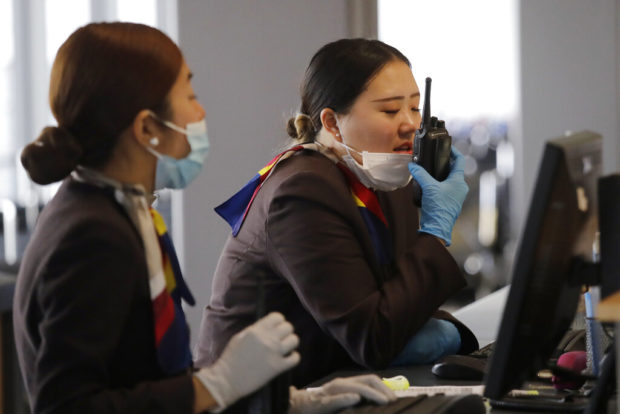
A gate agent pulls down her mask to speak on a radio at Seattle-Tacoma International Airport on Tuesday in SeaTac, Washington. (AP)
AID AVAILABLE: The World Bank announced Tuesday that it is making $12 billion available to provide immediate support to low-income countries dealing with the health and economic impacts of the coronavirus.
World Bank President David Malpass said the money will go to help developing nations strengthen their health systems that are fighting an epidemic that has already spread to more than 60 countries.
“The point is to move fast,” Malpass told reporters. “Speed is needed to save lives.”
Of the $12 billion in support, $8 billion represents new funds and $4 billion is being re-allocated from existing programs, Malpass said.
The World Bank funds are designed to help countries detect when the virus crosses their borders and purchase medical equipment to treat any outbreaks.
PUBLIC FORUMS: The 189-nation International Monetary Fund and its sister lending organization, the World Bank, announced Tuesday that they will replace their regular spring meetings in Washington with a “virtual format” in response to the coronavirus.
In a joint statement, IMF Managing Director Kristalina Georgieva and World Bank President David Malpass said their decision was being made given “growing health concerns related to the virus.”
The two global lending organizations normally hold an annual spring meeting in Washington, where they both have their headquarters. This year’s meeting had been scheduled for the week of April 13.
The statement said that the agency would fully employ their Information Technology facilities “to the fullest” to allow member countries to hold essential policy consultations that would have taken place in person.
CORPORATE TRAVEL: Due to the coronavirus threat, Ford Motor Co. and Fiat Chrysler Automobiles are requiring executive approval for air travel, with few exceptions.
In a memo to employees Tuesday, Ford CEO Jim Hackett said the company would ban all but essential travel through March 27. The decision will be reviewed weekly.
Fiat Chrysler is telling employees that all travel must be pre-approved by a leadership team member “and that travel be prioritized to essential needs only.”
The restrictions are among the most severe with regard to U.S. corporations.
Hackett said in the memo that the decision was based on based on statements by government infectious disease specialists.
The memo said exceptions would have to be approved by senior management. They have to be essential to company operations and be tasks that can only be done in if the traveler is physically present. Exceptions also cannot create an unacceptable health risk. They may be granted for something like the start of vehicle manufacturing, according to the memo.
“We ask that you look out on your calendar at least 90 days and find creative ways to complete work without traveling or having people needlessly come to us,” Hackett’s memo said, encouraging use of video conferences, telephone conversations and email.
On Sunday, Twitter tightened its guidance for employees on travel, but it was not an outright ban.
CONFERENCES GOING DARK: Adobe says it has canceled the in-person version of its eponymous Summit, scheduled for March 29 to April 2 in Las Vegas, due to concerns about COVID-19.
More than 20,000 people were expected to attend the conference, which will be held as an “online experience” this year, the company said. The move comes as trade events, conferences and other gatherings are being canceled — or moved online — around the world due to fears about the fast-spreading virus.
Google, meanwhile, said it is canceling its annual developers conference, Google I/O, that was to be held starting May 12 in Mountain View, California, due to concerns about coronavirus.
The company may consider “other ways to evolve Google I/O,” a spokeswoman said, suggesting it could hold digital events. Google has also halted international travel for all employees.
TV AND PARKS: NBC parent company Comcast said that because of insurance and the way contracts are written, NBC won’t suffer losses if the Olympics are canceled, but it’ll miss out on ad-driven profits, which were $250 million for the 2016 Rio Olympics.
Comcast also said that the closure of the Universal Studios Japan theme park for two weeks will hurt a key NBCUniversal profit measure by an additional 7% to 9% in the first quarter. The company also had to suspend construction of Universal Studios Beijing, but Comcast CEO Brian Roberts says “we’re back working” and expects to open the park on time in May 2021.

